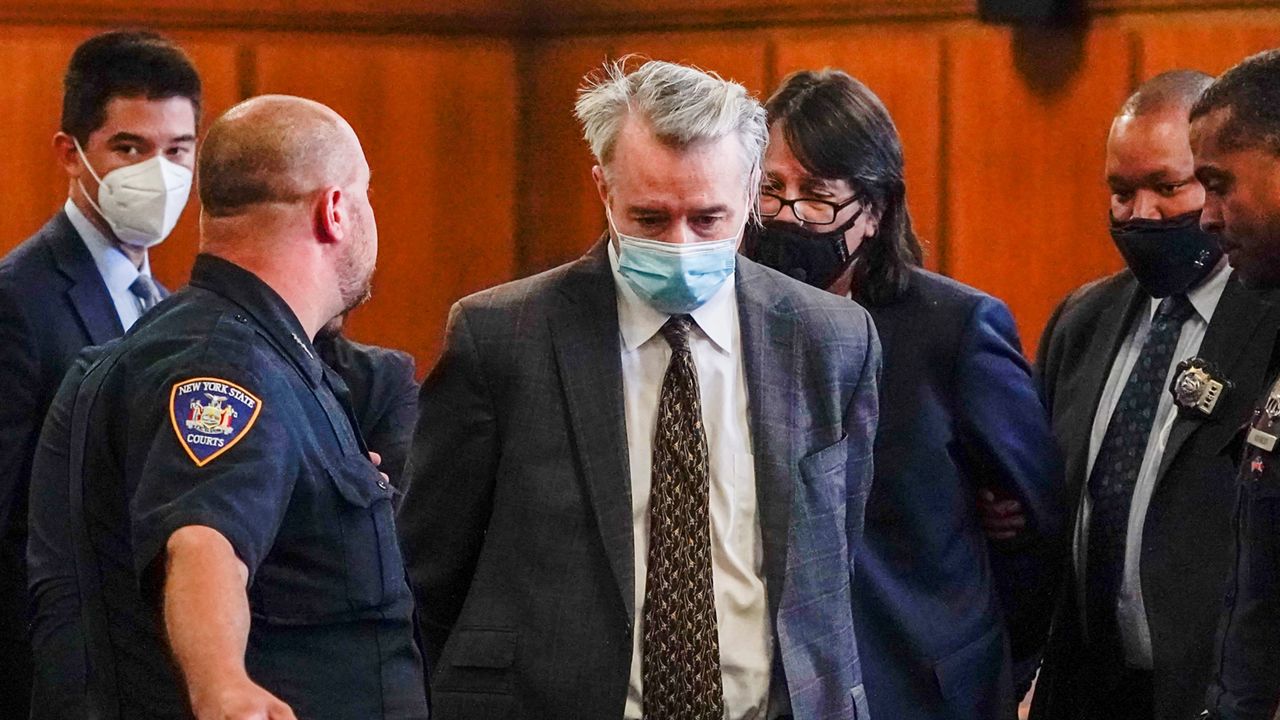NEW YORK (AP) — A rock memorabilia dealer and two other men were charged Tuesday with scheming to sell allegedly ill-gotten, handwritten lyrics to the classic rock juggernaut “Hotel California” and other hits by the Eagles.
Prosecutors said the trio lied to auction houses and buyers about the manuscripts' fuzzy chain of origin, coaching the person who provided the material about what to say. Meanwhile, the men tried to thwart Eagles co-founder Don Henley's efforts to reclaim the items, according to prosecutors.
“They made up stories about the origin of the documents and their right to possess them so they could turn a profit,” Manhattan District Attorney Alvin Bragg said.
Through their lawyers, rock auctioneer Edward Kosinski and co-defendants Glenn Horowitz and Craig Inciardi pleaded not guilty to conspiracy charges. Kosinski and Inciardi were also charged with criminal possession of stolen property, and Horowitz was charged with attempted criminal possession of stolen property and two counts of hindering prosecution. They were released without bail.
Their lawyers insist the men are innocent.
“The DA’s office alleges criminality where none exists and unfairly tarnishes the reputations of well-respected professionals,” defense attorneys Antonia Apps, Jonathan Bach and Stacey Richman said in a statement vowing to “fight these unjustified charges vigorously."
Apps, who represents Kosinski, later called the charges “the weakest criminal case I have seen in my entire career,” characterizing it as a “civil dispute” over ownership.
“Despite six years of investigating the case, the DA hasn’t included a single factual allegation in the indictment showing that my client did anything wrong,” she said in a statement.
The trove of documents included Henley’s notes and lyrics for “Hotel California” and two other singles from that eponymous, blockbuster album: “Life in the Fast Lane” and “New Kid In Town.” Prosecutors valued the material at over $1 million.
The writings are “irreplaceable pieces of musical history” and “an integral part of the legacy Don Henley has created over the course of his 50-plus-year career,” longtime Eagles manager Irving Azoff said in a statement.
He thanked prosecutors for bringing a case that exposes “the truth about music memorabilia sales of highly personal, stolen items hidden behind a facade of legitimacy.”
The chart-topping, Grammy-Award-winning single “Hotel California” is a touchstone of 1970s rock, with one of the era's most memorable guitar solos capping a musical tale of being lured into a glitzy, mysterious hotel where “you can check out any time you like, but you can never leave.” Theories about its meaning abound; Henley has said it’s about excess and a dark side of the American dream.
The Grammy-winning album has sold more than 26 million copies since its release in 1976, making it one of the best selling in history.
According to prosecutors and an indictment, Horowitz bought the documents around 2005 from a writer who worked on a never-published book about the Eagles in the late ’70s.
The writer, who isn't identified in the indictment, gave a variety of explanations to Horowitz over the years of where the documents came from.
In one email included in the indictment, the writer says Henley's assistant sent them from the musician's Malibu, California, home after the writer picked them out; in another, the writer found them discarded in a dressing room backstage at an Eagles concert; in another, someone who worked for the band gave them to him.
“It was about 35 years ago and my memory is foggy!” the writer said in a 2012 email.
By then, Kosinski and Inciardi had bought the documents from Horowitz; Kosinski had listed them for sale on his online auction site and inquiries about their origins were looming.
In subsequent emails, Horowitz and Inciardi worked to have the writer's “‘explanation’ shaped into a communication” — eventually, an April 2012 email saying that he didn't remember who gave him the documents. Kosinski sent it to Henley's lawyer, according to the indictment.
Later that month, Kosinski sold some “Hotel California” lyric sheets to Henley for $8,500, according to the indictment.
Inciardi and Kosinski then tried to peddle more of the Eagles documents to other potential buyers through Christie’s and Sotheby’s auction houses, while also offering to sell some to Henley, according to the indictment.
By 2017, with not only Henley's lawyers but the district attorney's office asking questions, Horowitz asked the writer whether he'd gotten the materials from another founding Eagles member, Glenn Frey, the indictment said. Frey had died the year before.
“Once you identify GF as the source of the tablet, you and I are out of this picture for good,” Horowitz wrote in a follow-up email.
The writer then provided a note to that effect, according to the indictment.



